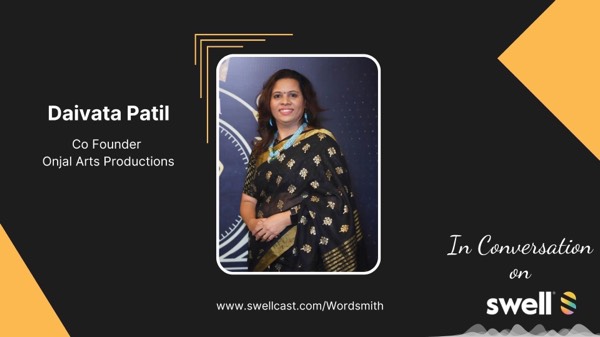
Sreeja V
@Wordsmith · 1:37
Gender equity in regional cinema in India: Daivata Patil, Co Founder, Onjal Arts Productions in conversation
Let me quickly jump in to really delve deep into this topic and ask you about your perspective on the need for gender sensitivity in regional cinema in India

Daivata Chavan-Patil
@Daivata · 3:22
You hardly have action films in Marathi, but whatever little you have, women are not shown as powerful characters. Horror again is the least explored genre. While there are some thriller films where we see women in action, but they are supporting the male lead and not taking up independent charge in the plot

Sreeja V
@Wordsmith · 1:24
And I think that's the hard part in terms of building a culture that remains gender sensitive and yet can be successful, can break out of these stereotypical portrayal of women. And I mean rightfully so. And while there are filmmakers across Marathi, Malayalam, Bengali, exploring a lot of novel, realistic themes, we still have a far, far way to go, I guess, before we see this playing out across all genres. Thank you for this

Daivata Chavan-Patil
@Daivata · 2:15
Ensuring women's representation in the films produced by me, that was also another challenge, which I think I felt it just puts a big responsibility on you as a woman producer that at least in your films, women's roles must not be stereotypical and biased. So, yes, this different job profile gave me a different identity. And then maintaining this different identity also became a challenge because the society doesn't want the woman to do something different. I hope I've answered to that question. Thank you

Sreeja V
@Wordsmith · 0:44
Indeed. You have answered my question daivata and very honestly, and I think such a realistic perspective of what the ground reality is. Which leads me on to the next question. You said that you have decided to take on the role for producer and the challenges that came with it. Do you, over the last decade or so, see some shift on sets, right, on film sets that seem to give some room or have led to more acceptance of women taking on roles during the filmmaking process itself?

Daivata Chavan-Patil
@Daivata · 2:01
I mean, if women are seen in their traditional roles such as makeup or hairdressing or costumes, then the increased number of women on film sets must not be considered as any achievement. We need to look at how many of them are in hierarchy by senior position. How many women DOPS or directors have increased in the past? How many action directors have increased in the past. Or it can be as simple as who is serving food on the sets? Is the contract given to women caterers?

Sreeja V
@Wordsmith · 0:35
Thank you so much for that no holds barred response. And true, very true. We need to see women in certain significant areas within the filmmaking process itself to really say that there has been a tremendous shift. But I'm happy to hear there has been some change over the years. But would you, in that case, say that gender parity still remains a distant dream in cinema per se? Would that be your perspective?

Daivata Chavan-Patil
@Daivata · 2:22
The media industry must have inclusive work policies and work environment. The media industry as compared to other industries. I would say that is slightly unorganized and therefore societies and families need to understand that nature of work in media industry and also accept working women in media sector with the background of unorganized media sector and thereby allowing more scope for women to take up media jobs and also not worry about balancing between work and life. Or maybe settlement in married life

Sreeja V
@Wordsmith · 1:28
And I think that over the last decade or so, we are seeing a lot of women put their passion first and choose to work in the media industry, despite the work life balance issues. And as you rightly mentioned, it's a disorganized space. So there has been a very chaotic sort of work environment. And I know that many women, including myself, in fact, have decided to pursue other industries purely because of this reason

Deborah Pardes
@DBPardes · 3:26
David and Sreeja. I wanted to just chime in here from Los Angeles, the City of Angels, the Dream makers town where they make movies, little movies, big movies. David, it was really interesting to hear this conversation about the duality of having female leadership to create great content that's representative of this conversation. It's kind of a loop because if someone's in the position of power, they obviously affect what is produced, and the stories that we tell create the reality we live in
